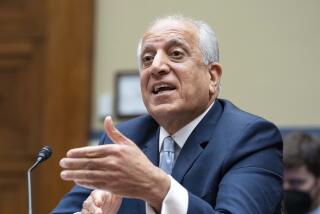U.S. Diplomat Defends Maliki’s Strategy
- Share via
BAGHDAD — U.S. Ambassador Zalmay Khalilzad said Saturday that he supported the Iraqi prime minister’s plan to disband sectarian militias through negotiations while using his military to go after the most extreme elements.
Khalilzad said he disagreed with recent complaints by U.S. military officials in Iraq and politicians in Washington that Prime Minister Nouri Maliki hasn’t been doing enough to rein in Shiite militias implicated in thousands of death squad killings.
Khalilzad said complaints by senior U.S. military leaders that Maliki was too soft on Shiite militias affiliated with his political bloc were evidence of “tactical differences” he has with those military officials. Gen. George W. Casey Jr., the top American military commander in Iraq, released a statement Friday disavowing the complaints.
Some commanders want to use troops to go after the militias, Khalilzad said, “but I think that as far as Gen. Casey and myself are concerned, we are in agreement that ... if political engagement can produce the desired result, then so much the better.”
Khalilzad said Maliki would release a “demobilize, decommission and re-integration” plan to begin the disbanding of militias by the end of the year. He also said the prime minister was working on a national reconciliation plan to bring Sunni Arab and Shiite militants into political dialogue.
But he acknowledged that there were still challenges.
“The situation remains difficult and the level of sectarian violence is high,” Khalilzad said.
He said U.S. officials were working to support Iraqi efforts to reform the Interior Ministry, which is believed to have been infiltrated by militiamen involved in hundreds of alleged death squad killings.
He said the U.S. conducted an investigation of an Iraqi police detention facility in Baghdad known as Site 4, where abuses were committed against some of the more than 1,300 prisoners held there.
Several high-ranking police officials were indicted as a result of the investigation, but Khalilzad said that Interior Minister Jawad Bolani, who oversees Iraq’s police force, has not acted on those indictments.
“He has heard either verbally or in writing that indictments have taken place,” Khalilzad said.
Other issues that need resolution include distribution of oil wealth and the pressure for the creation of autonomous zones in Iraq, Khalilzad said. Sunni Arab legislators pushed successfully last week to delay the formation of regional authorities. The Sunni Arabs were worried that oil-rich autonomous regions in the Kurdish north and the Shiite south would cut Sunni Arabs in the west out of a share in the country’s oil revenue.
Khalilzad said Iraqi politicians have agreed to distribute oil wealth according to population, which will be determined by a census planned for next year. But he said there was still disagreement about who is authorized to negotiate petroleum industry contracts.
The Kurdistan regional government already has launched negotiations on oil deals.
Khalilzad also said a joint committee this month would present a set of proposals to be used to determine the future role of U.S. troops. Khalilzad said the committee was creating a “road map” that would establish the conditions necessary for transfers of security responsibilities from U.S. to Iraqi troops.
U.S. officials have said that as Iraqi security forces become stronger, U.S. troops will be able to withdraw from Iraq.
More to Read
Sign up for Essential California
The most important California stories and recommendations in your inbox every morning.
You may occasionally receive promotional content from the Los Angeles Times.













